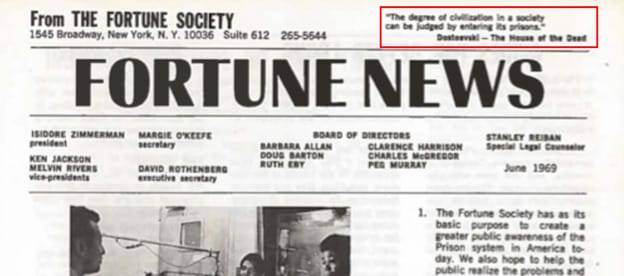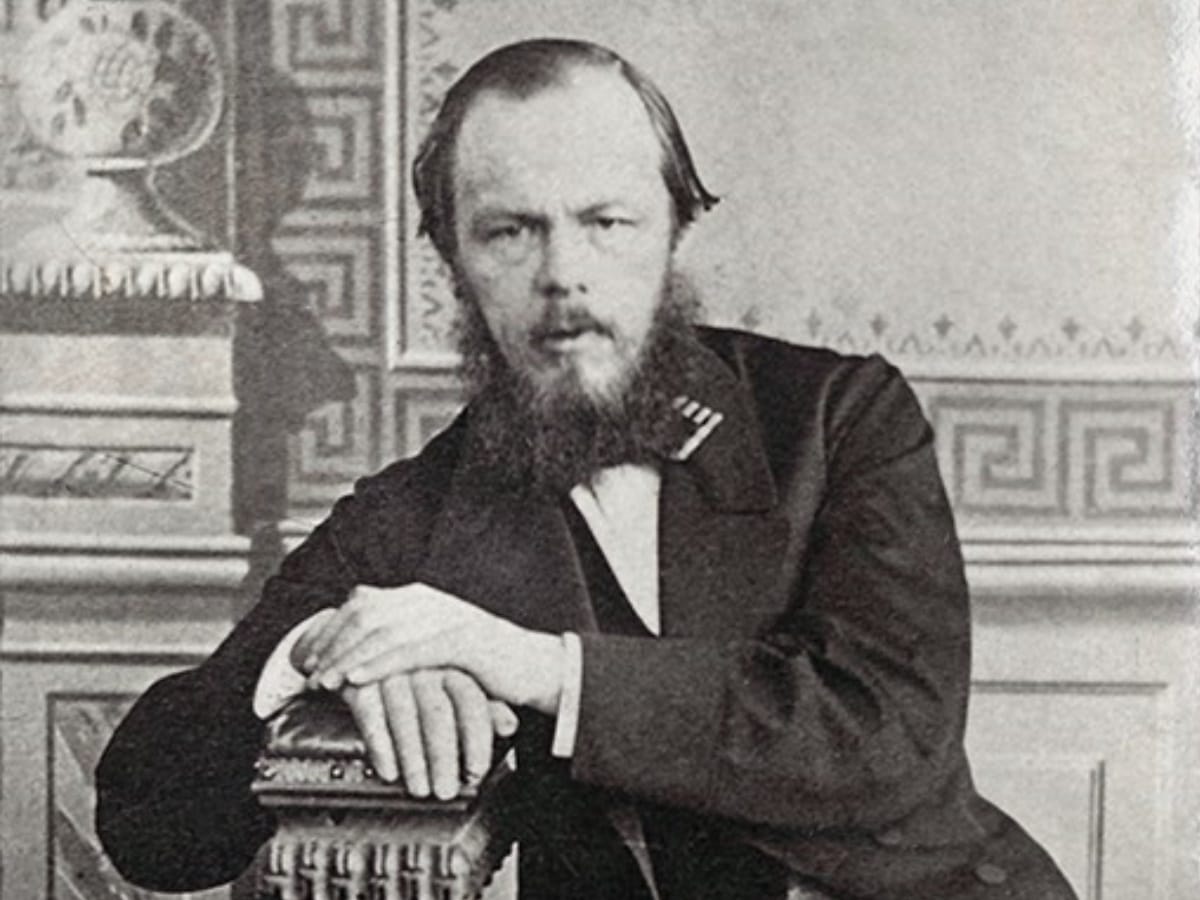In Russia and abroad they like to use a quote supposedly from the pen of a Russian writer. We checked whether Dostoevsky wrote anything similar.
The aphorism “The level of civilization of a society can be judged by its prisons” can often be seen in texts assessing the penitentiary system in a particular country. It is attributed to Dostoevsky by such sources as “Gazeta.ru», Armenian And Azerbaijani Radio Liberty service, magazineButterfly", newspaper "Our time", information and legal center "Human rights activists of the Urals" And "Bulletin of Moscow University of the Ministry of Internal Affairs of Russia" The phrase is widely used in scientific works And historical literature. The quote is no less popular in Canada, where, as writes journalist Patrick White, it can be heard “with sickening regularity” at thematic conferences. The saying was also used in the trailer for the film "air prison"about a division of the American police involved in the transportation of dangerous criminals. Often indicated, that the words about the connection between the quality of prisons and the level of civilization of society are taken from the story “Notes from the House of the Dead.”
Writer Fyodor Dostoevsky first-hand knewWhat is a prison? In the spring of 1849, among other members of the circle Petrashevtsy the future classic was arrested and imprisoned in the Peter and Paul Fortress. Eight months later, he was found guilty “of intent to overthrow the state order” and sentenced to death, which at the last moment was replaced by four years of hard labor with deprivation of “all rights of state” and subsequent surrender as a soldier. Dostoevsky served his punishment in the Omsk fortress among criminals. He later described this stage of his life in the story “Notes from the House of the Dead"(1862).
“Verified” studied the full text of this work and did not find a widely circulated phrase or similar thoughts there. Quotes such as “Of course, prisons and the system of forced labor do not reform the criminal; they only punish him and protect society from further attacks by the villain on his peace” and “A society that looks indifferently at such a phenomenon [as corporal punishment] is itself already infected at its core,” although they are devoted to the same topic, they carry a slightly different meaning.
Moreover, we did not find any similar quotation in the 30-volume complete collected works writer, nor in the database of the Google Books project for the 19th or 20th century by anyone else. The only exception is Russian translation books by American historian Howard Zinn “The USA after the Second World War”, published in the USSR in 1977. However, the authorship of the quote is not indicated there. And on Russian-language websites, the phrase began to be attributed to Dostoevsky only in the second half of the 2000s.
All this, as well as the enormous (compared to Runet) popularity of the quote in English-language sources, suggests that it would be reasonable to continue the search in English. In an authoritative reference book Respectfully Quoted: A Dictionary of Quotations for 1989 contains the statement “The degree of civilization in a society can be judged by entering its prisons,” which almost word for word coincides with the quote attributed to Dostoevsky. Next to this phrase it says: “Attributed to Fyodor Dostoevsky. Not verified." Let us note that overseas the statement has a much longer history: for example, it was heard in the US Congress and in 1969 year, and in 1971, and in 1977, and each time with a reference to “Notes from the House of the Dead.” In the Michigan Law Review approvedthat the quotation can be found in Constance Garnett's specific translation of the story into English, however this information incorrect. Mentions of a phrase allegedly by Dostoevsky in sources before 1969 in the project “Google Books» could not be found.
What happened shortly before this? In 1964, Canadian playwright and former prisoner John Herbert wrote social play on a prison theme called Fortune and Men's Eyes (a quote from a Shakespearean sonnet, which was translated into Russian as “At contention with the world and fate”). In his interviews about the play, Herbert often quoted supposedly Dostoevsky's words about prisons and civilization. In 1967, “At Discord with the World and Fate” was released for the first time delivered in New York, where its popularity began. Impressed by the topic raised, the director of the play, David Rotenberg, founded a society to protect the rights of prisoners and called it Fortune Society. The organization took the aphorism attributed to the Russian writer as motto and began placing it on the front page of her newsletter.


Given the lack of earlier references to the phrase, responsibility for the appearance and dissemination of the quotation, allegedly from Notes from the House of the Dead, most likely lies with playwright John Herbert and director David Rothenberg, founder of the Fortune Society. But they were not the first to express such an idea. So, back in 1910, Winston Churchill stated in the House of Commons that “the public sentiment towards crime and criminals is one of the surest tests of the civility of any country.” His compatriot, philanthropist John Howard, a century and a half earlier expressed an opinion even more similar to the “Dostoevsky quote”: “The state of prisons and the living conditions of prisoners are good indicators of the development of any society and the degree of its civilization.”
Note that Dostoevsky often a more “Churchillian” version of the phrase is also attributed: “A society should be judged not by how it treats its distinguished citizens, but by how it treats its criminals.” But this attribution became widespread even later than Herbert's play appeared, and this version of the phrase probably goes back to an almost identical maxim of the American orator of the late 19th century Robert Ingersoll. Apparently, the name of Dostoevsky appeared under it precisely because of the already established connection to the first quote, similar in meaning.
Thus, a rather obvious idea about the connection between the quality of the penitentiary system and the level of civilization of society in one form or another was expressed by many people, but Dostoevsky definitely had nothing to do with it.
Cover photo: Wikimedia Commons.
Read on topic:
1. Is it true that Dostoevsky is the author of the Christmas poem “God’s Gift”?
2. Is it true that Dostoevsky is the author of the phrase “We all came out of Gogol’s “Overcoat””?
3. Did Dostoevsky say: “Tolerance will reach such a level that smart people will be forbidden to think, so as not to offend idiots”?
If you find a spelling or grammatical error, please let us know by highlighting the error text and clicking Ctrl+Enter.






